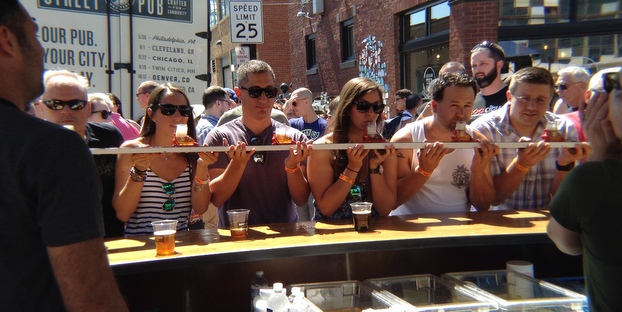
The odds are you didn’t open a brewery to look like the other 8,999 out there. You had a vision to be a place people gathered for the shared love of beer brewed on-premise. You desired to create a welcoming space where those in your community could come together and create memories. You aimed to create a taproom that had a unique vibe, staff, and experience not felt anywhere else. You aimed to be different.
With 9,000 breweries and counting, it is vital to not only make high quality beer, but to also create an overall experience that leaves your guests craving more. One of the many ways you successfully do so is by hosting events.
And there is no playbook to follow, but rather the mindset that as an entrepreneur you will forever be striving to find repeatable strategies that can make your life easier and more successful. You and your team know your space and your audience best. It is our hope that the concepts discussed here can simply inspire you to never stop crafting innovative and memorable experiences.
Because letters are fun, we are going to use the word “NANO” as an acronym to help you stay on track when planning events. Whether you are the nano-ist of nano breweries or one of the top 50 in the United States, these 4 concepts matter. Big shout out to the team at Brew Your Own Magazine for the inspiration to write a piece on what a taproom should consider when using their space.
N – Need
A – Authenticity
N – Numbers
O – Originality
Is there a need?
Let’s begin with need (N). When you begin to brainstorm what events you may host, first ask yourself, “Is there a need?” Have your guests been requesting a trivia night based on some obscure 80’s sci-fi show? Do you frequently have patrons wishing there was a small concert venue in your area that featured acoustic acts? Would it be a good idea to host a seasonal food and beer pairing?
A simple way to determine the need is to ask your guests.
Ask them while in your taproom; ask them on your social media; ask them wherever and whenever they may be excited to provide input. Determine if there’s a demand, how large that demand may be, and then ask yourself if the idea at hand is feasible in your taproom. You may have some surprising, and exciting, discoveries during this process.
Is it true to your brand?
Authenticity (A) would have been a better first letter to begin with, unfortunately I can’t change the spelling of nano. Even more important than the need for a particular event, it is vital for you to stay true to your brand. Is hosting an intimate, politically charged gathering at your small, sports-themed taproom going to gel with your clientele? Probably not. Is partnering with the SPCA on a Saturday rescue event going to go over well? It just might if you’re still pulling double duty as a veterinarian and highly engaged with the local animal lover community.
Don’t simply host an event because.
I repeat, do not just let any event take place in your taproom. Everything that happens in your taproom reflects your core values. Does your brewery have a mission statement? If not, sit down right now and begin the process. A simple google search of your favorite brands and breweries is a great start for inspiration.
This mission statement should carry over to every decision that happens at your brewery. Sure, you run a business, but selling yourself to the devil and aligning yourself with ideas and partners that do not line up with your values can ultimately be detrimental.
Now to handle the second N, which represents the numbers, I’d like to pass the baton to my co-pilot in Taproom Success, Kary Shumway.
Does it make financial sense?
One of the mistakes that I often see with event planning is a failure to set a financial budget, or a goal for the expected outcome.
It’s easy to get excited about the event: All the folks that will show up, and the fun everyone will have. But, it’s a lot less fun when you put in all that effort only to realize afterwards that you lost money.
Setting a financial plan for your events is straightforward, but requires a little bit of work upfront.
To begin, make a listing of all the things you’ll need to buy for the event. This might include supplies, decorations, and outside vendors.
Next, make an estimate of how much time you’ll spend on the event. List out the people who will be involved in setting up and working the event. Think about how many hours each person will put in, and calculate a rough estimate of labor costs.
After estimating the expenses, project out the expected sales from the event. How many people will attend? How much will they spend? Will there be pre-sold tickets? Will you have special merchandise that supports the event?
Lastly, look back on past events and figure out if you missed anything. Were there expenses that you forgot about, like that tent rental, or the cost of the special permit from the town? How about sales estimates? Were you too conservative in making your projections?
Doing a little bit of work upfront in setting a financial plan can go a long way towards making sure your event is not only a lot of fun, but profitable as well.
Is anyone else doing it?
The ”O” stands for originality. Forget what I said about need. Originality is your chance to do something no one else in your area is doing. This is your opportunity to innovate. I absolutely love the “try anything once” approach. This is your chance to forget whether there’s a need and take a chance. Of course, this must be well-thought out. You can’t simply decide to host an event and expect the “if you build it, they will come” results.
The “O” is why you opened a brewery. This is where your creativity shines. Slow Tuesday? Try that wacky idea you’ve considered. Worst case, you have that regular ole’ slow Tuesday and you give up after a few tries. Best case? Your stab at hosting a Dungeons and Dragons league takes off and now you have a potentially new audience and revenue stream. Some will fail miserably, some will ignite a fire in your guests that they didn’t know they needed, but all will be learning experiences.
It was not our aim to give you a list of tried-and-true events to host. It is our goal to challenge you to discover what works best. The best part of our industry is that every taproom represents a unique experience.
Let’s end with a checklist to help you find the events that may work best in your taproom. Ask yourself:
- Have my guests been asking for this? (The answer is often, but not always “yes”)
- Does the potential event align with our core values? (The answer must always be “yes”)
- Is the idea financially viable? (Most commonly, “yes”, right Kary?)
- Will it help me stand out? (Should be a strong “yes”)
If you get through these four questions with four, mostly yeses, we wish you the best of luck and hope to be there to experience it.
This piece comes from the Taproom Success team of Andrew Coplon and Kary Shumway. Taproom Success Membership gives you the tools, resources, and support you need to manage and grow your taproom business. From fundamentals, to best practices, backed by data, and actionable strategies, the Taproom Success Membership fills the void of taproom educational opportunities.





Leave a Reply
You must be logged in to post a comment.